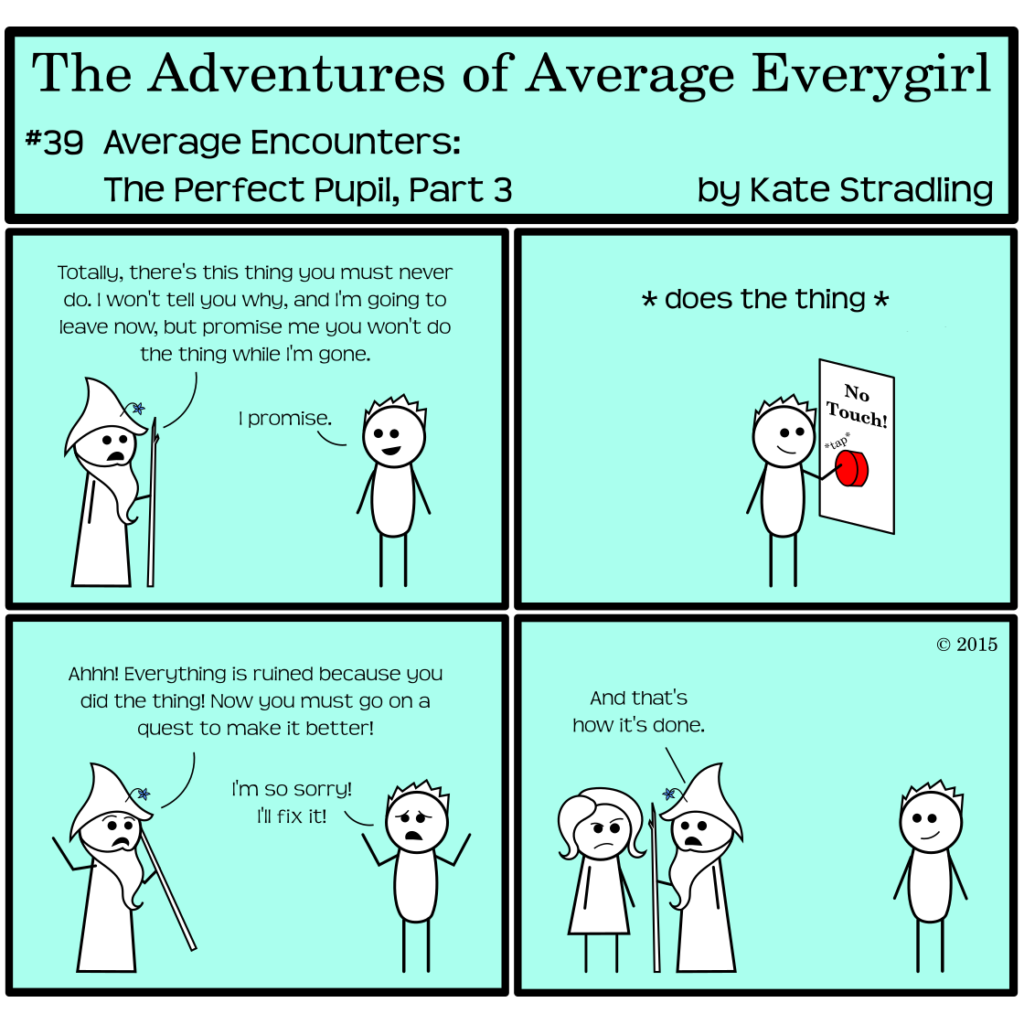
Here’s what I don’t understand. If someone majorly screws up, why does anyone trust that same someone to correct the massive error? You may be as well-meaning as a nun, O Clumsy Protagonist, but I instinctively want you far, far away from anything and everything regarding the conflict you just caused.
But of course, the protagonist must prove his worth. And, as the Narrative Fates would often have it, he pretty much ends up being the only one capable of correcting the mistake.
Because contrived plot.
Or not. In justifying this trope, I’ve come up with some possible reasons a bumbling protagonist might be let back into the action.
Reason #1: Nepotism trumps trust
The protagonist is related to the person in charge, who may or may not be competent. Assuming the relative of higher status is competent, one of the following conditions may apply:
- The relative has a soft spot for the bumbling protagonist. They might not trust the bumbler’s skills, but they feel obligated to let them give the fix an honest try.
- The relative shrewdly sees the conflict as an opportunity for the bumbling protagonist to mature and develop character.
- The relative hates the bumbling protagonist. Far from a situation of trust, this is an opportunity to let the bumbler die without having to actively kill them.
Note that in the first two conditions, the conflict can’t be too dire. You don’t send someone you care about into a situation that’s obviously far above their abilities, character-development opportunity or not. Such an act would tip the higher-ranked relative toward the incompetent side of the scale (which I’m not against, mind you) unless the situation is so dire that there’s absolutely no hope to overcome it.
I mean, if everyone’s going to die anyway, why not let the screw-up take a whack at solving things, amirite?
Reason #2: Superstition overcomes sense
The protagonist bears marks that indicate they are the Prophesied Hero. Whoever is in charge recognizes this and defers to that belief.
This one can readily feel like a cheap ploy, unless those prophesies are solid as all get-out. I guess my belief in this would depend heavily on the world-building and character development for the story. If either of these are shoddy, kiss the validity of this excuse goodbye.
Its near cousin, Mistaken for a Prophesied Hero, gets trotted out fairly frequently. The protagonist gets called before higher powers who think he’s a Prophesied Hero, he screws up royally (thus disproving their assumptions), and then works to fix his error. Sometimes he ends up being the true Prophesied Hero after all. Sometimes he proves that we each determine our own fate.
Reason #3: Subterfuge forces inclusion
The protagonist is forbidden from helping to fix the problem, but they defy orders. Some possibilities for this one:
- The bumbler stows away with the company of heroes, not discovered until it’s too late to return them.
- They switch places with the chosen hero. No one discovers the switch until it’s too late.
- They set off on their own, perhaps with a friend they trust or an animal sidekick who doesn’t know better, and no one discovers they’re missing until it’s too late.
You might have noticed a common theme. In cases involving subterfuge, timing is an essential factor. Because no one wants the protagonist anywhere near the conflict, no one can discover what they’re up to until they’re past the point of no return. Otherwise they get sent back to square one.
Trust Restored
I’m sure there are a multitude of situations that might justify a bumbling protagonist getting a second chance. The one that doesn’t fly, for me, is when they receive that second chance simply because they’re the protagonist.
“Why?” is the best question an author can ask when plotting a story. If there’s no sure answer, keep digging until you have one.